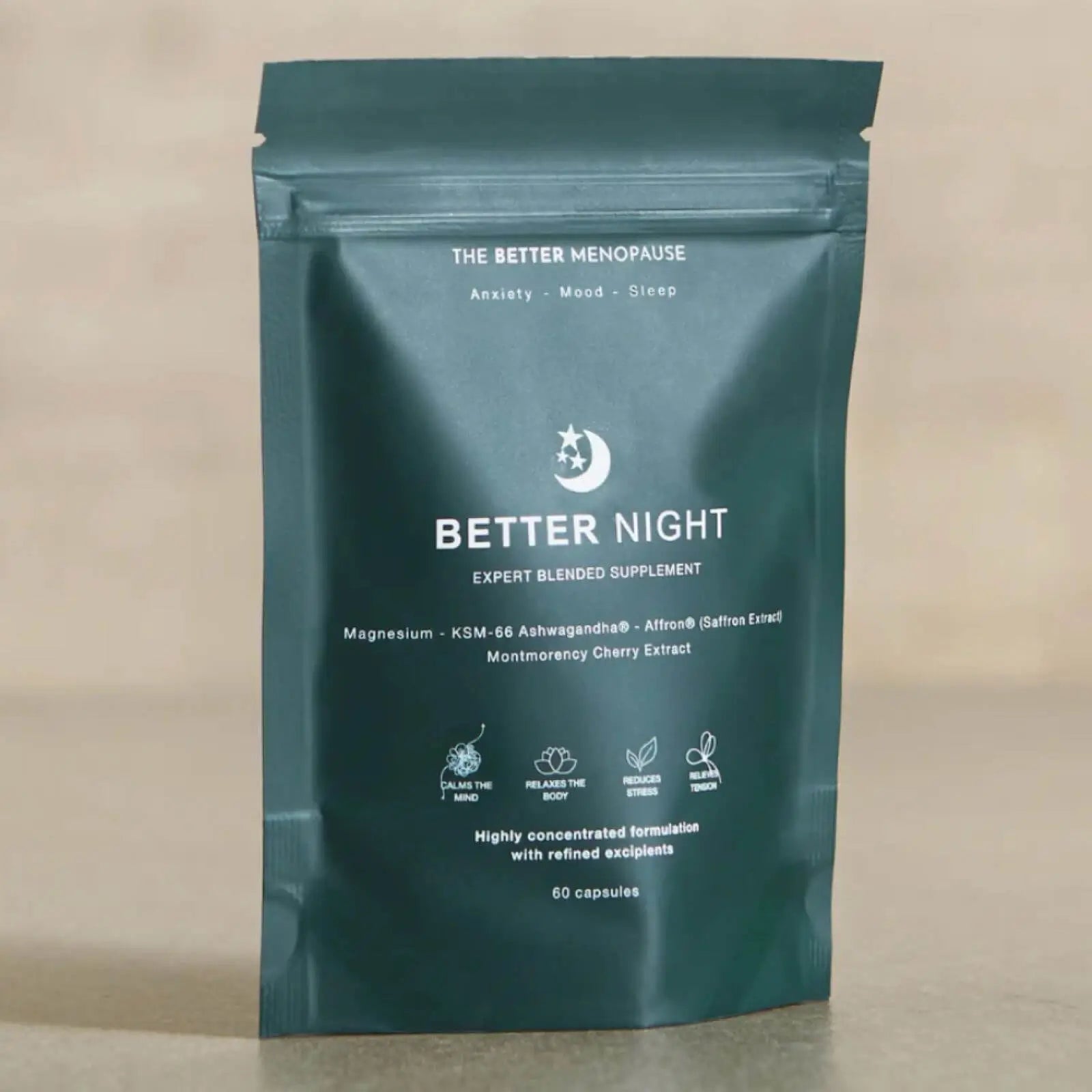
What causes menopause bloating, and what can help?
Exploring hormonal changes and the other potential causes of bloating during menopause, plus the lifestyle changes and other remedies that could help.
A bloated, uncomfortably full or swollen belly is a common symptom of menopause, and particularly perimenopause. At the same time, you might also notice an increase in the fat around your waist.
Fluctuating hormones are often at the root of these issues, but there are a number of other possible causes too.
Things you can do to relieve these symptoms include improving your diet, focusing on certain types of exercise and being aware of potential food intolerances.
Some herbal remedies may also help, while probiotic supplements can play an important role by introducing friendly bacteria into your gut.
The Better Gut probiotics contain a range of specially selected bacteria that can reduce bloating and help you to maintain a healthy weight.
To find out more visit The Better Gut. And get 10% off your first order with the discount code WELCOME10.
Does menopause cause bloating?
During perimenopause – the transition to menopause – reproductive hormones like oestrogen and progesterone are in a state of flux.
Although hormone levels eventually decline as you head towards menopause, before that they can go up as well as down.
Increased levels of oestrogen can lead to water retention, which is one cause of bloating.
Raised levels of progesterone can slow the movement of your gut muscles, increasing the time it takes for food to make its way through your digestive system. This can also lead to a bloated feeling.
Other causes of bloating
Hormonal changes are not the only potential cause of bloating. Other things to consider include:
- Food intolerances: Gas, bloating and other digestive issues are common symptoms of food intolerances. You’re probably aware of lactose intolerance, involving dairy products, but we’ll also look at the potential effects of plant sugars known as FODMAPs.
- Not getting enough fibre: Most people in the UK and United States eat significantly less than the recommended amount of fibre, which can lead to slowed digestion, constipation and bloating.
- Swallowing air or gas: Strange as it may sound, when you chew gum or eat too fast, you can swallow air at the same time, which can lead to bloating. The carbon dioxide gas in fizzy drinks can have a similar result, so cutting down could help.
- Supplements: Some supplements can help with bloating, but others, including calcium and iron, can actually cause it. Always talk to your doctor before you stop taking anything you’ve been prescribed.
- Medical conditions: Bloating during perimenopause or menopause is generally not a sign of a serious health conditions. However, it can be related to illnesses including irritable bowel syndrome (IBS), celiac disease and ovarian cancer. If symptoms continue, talk to your doctor.
Ways to relieve menopause bloating
Depending on what's causing your bloating during perimenopause and menopause, the following lifestyle changes could help.
Identify trigger foods
Eating lots of plant foods is generally great for your health and digestion. However, some people struggle to process sugars known as FODMAPs (Fermentable Oligo-, Di-, Mono-saccharides And Polyols) in certain plants, as well as lactose in dairy products. This can cause bloating, gas and other digestive issues.
FODMAPs are found in a range of foods, including:
- sweets and snacks
- bread, pasta and grains
- root vegetables
- beans and pulses
- berries and other fruits
The good news is that many people only have difficulty with one type of FODMAP, so only certain foods are a problem. Also, these intolerances can go away, which means any changes you make to your diet may not have to be forever.
Keeping a food diary can help you to identify whether particular foods trigger your symptoms. It’s then a good idea to talk to a doctor or nutritionist about whether you should try an ‘elimination diet’, where you remove certain foods and then gradually reintroduce them.
Eat more fibre
If you have a food intolerance, certain plants containing fibre could contribute to your bloating. But if your bloating is caused by constipation, gradually adding more fibre to your diet could improve things.
There are two main types of fibre that can help in this case. Many plant foods contain both types but some are better sources of one than the other.
- Soluble fibre takes on water to form a gel in your gut. This makes your poo softer and easier to pass. Soluble fibre is found in oats, barley, beans and pulses, apples (not the skins), berries, stone fruits, nuts and seeds, and lots of different vegetables. Flaxseeds are a particularly good source.
- Insoluble fibre adds bulk to your poo, helping it to move more quickly through your gut. You can get it from whole grains, some fruits and a wide range of vegetables.
Government guidelines say you should eat 30 grams (g) of fibre each day, but most people only get around 20 g.
Try these types of exercise
Exercise is, of course, great for your overall health but it can also have a specific impact on perimenopause and menopause symptoms, including bloating.
- Aerobic exercise: Studies have shown that as little as 20 minutes of aerobic, or cardio, exercise three times a week can reduce bloating caused by fluctuating hormones.
- Yoga: For quick relief from gas and bloating, consult a yoga teacher or watch an online video to learn specific poses that can help with trapped wind. Yoga also improves your posture, which could be helpful as studies have shown that you pass gas more easily when you’re sitting upright.
- Abdominal massage: Learning how to massage your belly could relieve bloating, as well menstrual pain and cramps. The NHS recommends a range of techniques.
Stay hydrated
Perhaps surprisingly, dehydration can actually lead to water retention and bloating as your tissues hold on to essential fluids.
As you get older, you can become less sensitive to your body’s thirst signals so it’s important to remember to drink regularly throughout the day.
The NHS recommends drinking 6 to 8 cups of water each day, but you may need more if it’s a hot day or you’re working out.
Having said that, it’s also worth remembering that tea and coffee count and that if you increase the amount of fruit and vegetables you eat, you’ll be getting more liquid that way too.
Probiotic supplements for menopause bloating
Probiotics are beneficial live bacteria. The right probiotic supplements can improve your overall gut health and reduce bloating.
Scientists have identified several strains of probiotic bacteria that can help with digestive issues that could lead to bloating during perimenopause and menopause:
- Lactobacillus acidophilus: reduces bloating and inflammation
- Bifidobacterium bifidum: eases constipation and improves regularity
- Bifidobacterium lactis and Lactobacillus rhamnosus: improve IBS symptoms
You can find all of these strains in The Better Gut probiotics.
These award-winning supplements can also help to manage a range of other menopause symptoms, including:
- hot flashes and night sweats
- mood and symptoms of anxiety and depression
- brain fog and mental fatigue
- sleep quality
- bone density and risk of osteoporosis
- vaginal health
- maintaining a healthy weight
For regular expert tips on menopause health and nutrition – and 10% off your first Better Gut order – sign up for our newsletter.
Natural remedies for menopause bloating
These traditional remedies for bloating also have some scientific evidence to support them:
- Peppermint oil: The menthol in peppermint oil is an anti-spasmodic, meaning it helps your intestinal muscles to relax. Studies have shown that peppermint oil supplements can reduce abdominal pain and bloating for people with IBS.
- Ginger powder: Supplements containing powdered ginger could help if you experience discomfort after eating. They can speed up the process of emptying your stomach, helping you to feel less full and reducing bloating and abdominal pain.
- Chasteberry: Although results are mixed, some studies suggest that the fruit of this Mediterranean shrub, also known as V agnus-castus, can reduce bloating, along with other hormonal symptoms.
How long does menopause bloating last?
Everyone’s experience of menopause is different and how long your bloating lasts will depend on your individual body chemistry and, of course, what’s causing it in the first place.
If hormone changes are responsible, you may have spells of bloating on and off for months or even years during perimenopause, as your levels of oestrogen and progesterone continue to fluctuate. As you get closer to menopause, and your hormone levels start to settle down, your symptoms may begin to taper off.
When to see a doctor about bloating
Bloating is a common symptom of perimenopause and menopause. However, it can sometimes be a sign of an illness.
The NHS recommends talking to your doctor if:
- Your symptoms have lasted 3 weeks or more
- Your symptoms keep coming back
- They make it hard to do everyday activities
- Changing your diet hasn’t helped
- You have a swelling or lump in your tummy
- You have several digestive symptoms together
Menopause belly and weight gain
Sometimes known as menopause belly, another potential symptom of menopause is weight gain around your waist. If you also have bloating, it can sometimes be hard to know where one symptom ends and the other begins.
As with bloating, changes to your hormone levels are one of the possible causes of menopause belly. But while spikes in oestrogen can be responsible for bloating, it’s the eventual drop in oestrogen as you approach menopause that can lead to weight gain.
As oestrogen falls, levels of other reproductive hormones called androgens rise. It’s this combination that leads to fat increasing, or being redistributed, around your waist.
Being less active than you used to be, or eating less healthily, can also contribute to weight gain during menopause. Some women find that their tastes in food, and what they crave, can change.
Some of the same lifestyle changes that may reduce bloating can also help you to manage weight gain and menopause belly.
Experts recommend eating a diet rich in fruits and vegetables. This will provide plenty of fibre, antioxidants and compounds called phytoestrogens, which mimic some of the functions of oestrogen.
Regular exercise, including both cardio and resistance training, can also help you to lose weight and increase your healthy muscle mass.
Summary
Hormonal fluctuations during perimenopause can impact your gastric health, slowing digestion and leading to water retention and bloating.
Eating more fibre, doing regular aerobic exercise and identifying potential food intolerances could all lessen symptoms, while yoga and abdominal massage may provide faster relief. Some natural remedies could also help.
Probiotic supplements can reduce bloating, and help you to maintain a healthy weight, as well as easing a range of other perimenopause and menopause symptoms.
To take your first step towards a better menopause, try The Better Gut probiotic supplements.
And for 10% off your first order, use the discount code WELCOME10.



